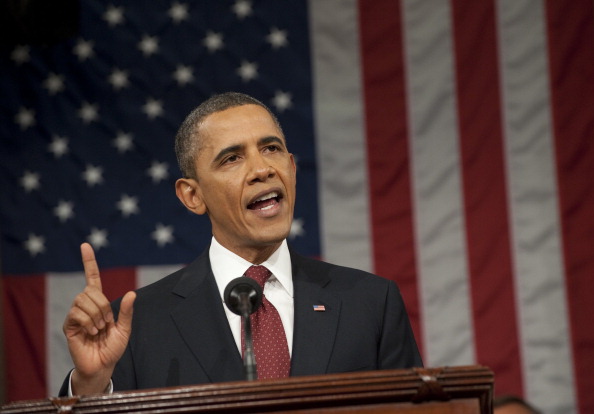January 25, 2012 | 10:13 AM | By Elahe Izadi
State of the Union: DCentric Outtakes

Saul Loeb-Pool / Getty Images
U.S. President Barack Obama delivers his State of the Union address before a joint session of Congress on Capitol Hill.
President Barack Obama devoted much of Tuesday night’s State of the Union address to leveling class disparities between the middle class and the very rich.
He didn’t embrace the rhetoric of the Occupy Movement – namely that 99 percent of Americans are suffering while 1 percent hold the wealth. But the president did say that 98 percent of Americans make less than $250,000, and that their taxes shouldn’t go up. Raising taxes on the wealthy is an issue with local relevance; the D.C. Council in 2011 narrowly approved a tax hike on those making $350,000 or more a year.
President Obama pushed for a resurgence of American manufacturing to combat joblessness. He also said there are available jobs in the technology and science industries, but not many people are qualified to fill them. Such a “skills gap” exists in D.C., where many of the unemployed lack the credentials needed to fill available jobs. President Obama made a “national commitment to train 2 million Americans with skills that will lead directly to a job.” That commitment may be easier said than done. D.C.’s job training programs have been fraught with problems and don’t always lead to jobs. There are current efforts underway to reform them so such programs are more effective.
Immigration also had a brief moment during the State of the Union address. Deportations have reached record levels under President Obama. He called for “comprehensive immigration reform” but failed to give specifics. He did, however, urge the passage of the DREAM Act, which would create a path to citizenship for undocumented college students and soldiers.
The issue of race was barely mentioned, with President Obama focusing mostly on class issues, despite the fact that class disparities fall sharply along racial lines. For instance, the black unemployment rate is more than double the white unemployment rate. Here’s the most explicit mention of race, and it came as President Obama directly addressed members of Congress:
Those of us who’ve been sent here to serve can learn a thing or two from the service of our troops. When you put on that uniform, it doesn’t matter if you’re black or white; Asian, Latino, Native American; conservative, liberal; rich, poor; gay, straight. When you’re marching into battle, you look out for the person next to you, or the mission fails. When you’re in the thick of the fight, you rise or fall as one unit, serving one nation, leaving no one behind.
Do you think race should have been more directly addressed? What are your thoughts on Tuesday night’s State of the Union address? You can read the entire speech here.
MORE POSTS ABOUT
- Government
- Immigration
- Race and Class
- Racial disparities
- Unemployment
-
Resentment And Race In Reducing Government

The black middle class has been hit particularly hard by the recession; many of the economic gains earned over 50 years disappeared between 2007 and 2009. The foreclosure crisis, lack of accumulated wealth and the role of a college education in … Read More
- Can Wireless Tablets Bridge The Digital and Education Divide?
- The Effect Of Youth Unemployment On Crime
-
DCentric Picks: Contemporary Dance Explores Asian American Experience

What: Dana Tai Soon Burgess & Co. spring dance performance. When: 8 p.m. Thursday and Friday. Where: George Washington University’s Dorothy Betts Marvin Theatre (800 21st St. NW). Cost: Tickets range from $15 to $25. Why you should go: The … Read More
- DCentric Picks: 'Communities in Translation,' Gold Leaf Closing Party
- Immigrants and D.C. Unemployment
-
Can A Party Change Perceptions Of Anacostia?

Trapeze artists hovered above a crowd. A band played electronic music as green lasers flashed through the room. Nearby, people created silk-screened T-shirts, a video installation played against the wall and the crowd tossed a large, clear plastic bubble filled … Read More
- Five Facts About D.C.'s Gap Between Rich and Poor
- Why Retirement is Tougher for Blacks, Latinos
-
Explaining the Coverage Gap for Missing People of Color

A new TV show premiered this week on TV One, focusing on cases of missing African Americans. One of the first featured stories was about a missing D.C. black woman. The show, “Finding Our Missing,” aims to correct the disparity … Read More
- 'Finding Our Missing' and Disparities in Missing Persons Coverage
-
Resentment And Race In Reducing Government

The black middle class has been hit particularly hard by the recession; many of the economic gains earned over 50 years disappeared between 2007 and 2009. The foreclosure crisis, lack of accumulated wealth and the role of a college education in … Read More
- The Effect Of Youth Unemployment On Crime
- Unemployment Down For Whites, Up for Blacks, Hispanics
-
Kmacnme


